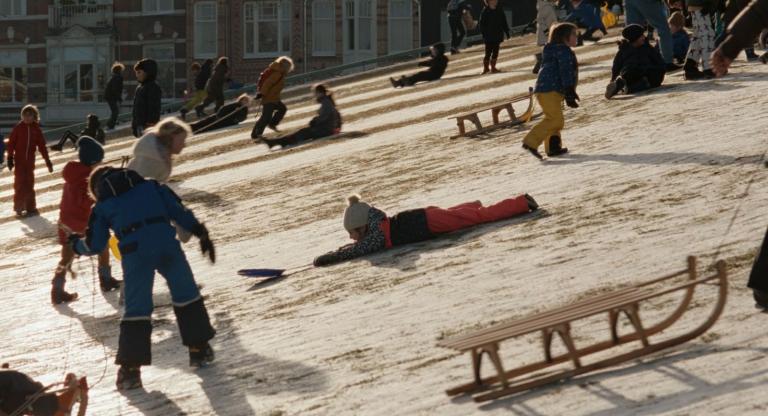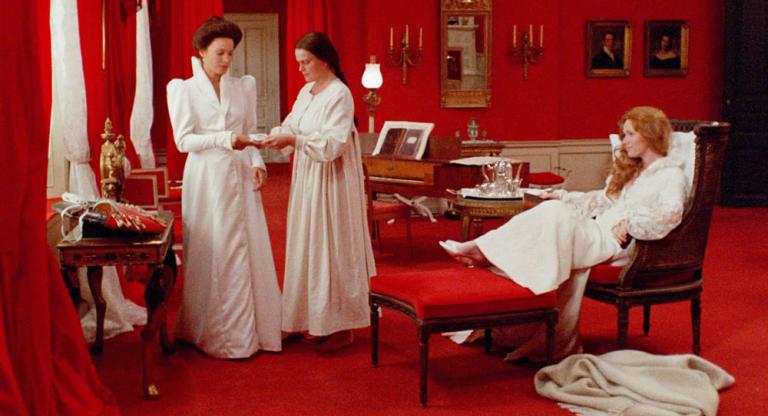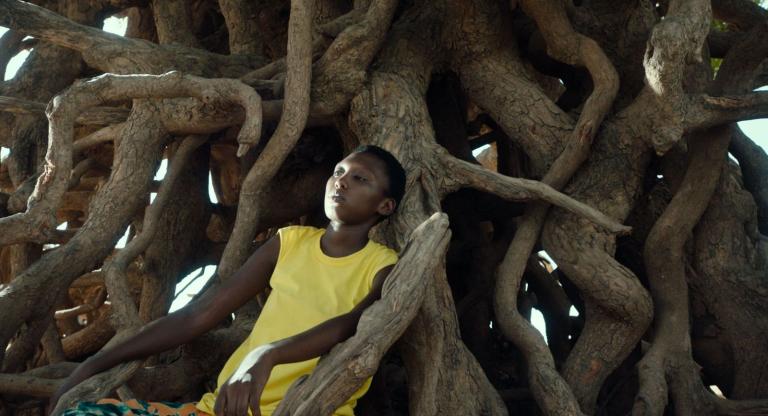A few months ago, I watched a film that was unlike any other I’d seen. It was a long, dry, plotless documentary about Amsterdam under Nazi rule. By the end, I was sobbing in my seat. Occupied City (2023) is a towering accomplishment, a maddening puzzle that is utterly simple in design: a mostly still camera takes in mundane scenes of present-day Amsterdam, which correspond to disembodied, dispassionate narration relating the events that unfolded in those locations during World War II. By the end, the viewer is completely crushed by the weight of history, including the cataloging of thousands of deaths. I left the theater eager to discuss the film with its authors, the director Steve McQueen and the historian Bianca Stigter, McQueen’s partner, who wrote the Dutch-language book on which the film is based, Atlas of an Occupied City.
Occupied City is a film about absence in two senses: First, the absence of the people who aren’t in the film, the ghosts McQueen and Stigter lived with as longtime residents of Amsterdam, ghosts who populate every inch of negative space in the frame. And then there is the absence of easy interpretation; the viewer must co-author any meaning projected onto the interplay of image and narration.
I had not anticipated that one of the more lively, funny, and challenging conversations I had all year would be in relation to a four-and-a-half-hour Holocaust documentary, but I found in McQueen and Stigter the kind of rigor that lends itself to good-natured combativeness. The transcript of the interview has been edited and condensed.
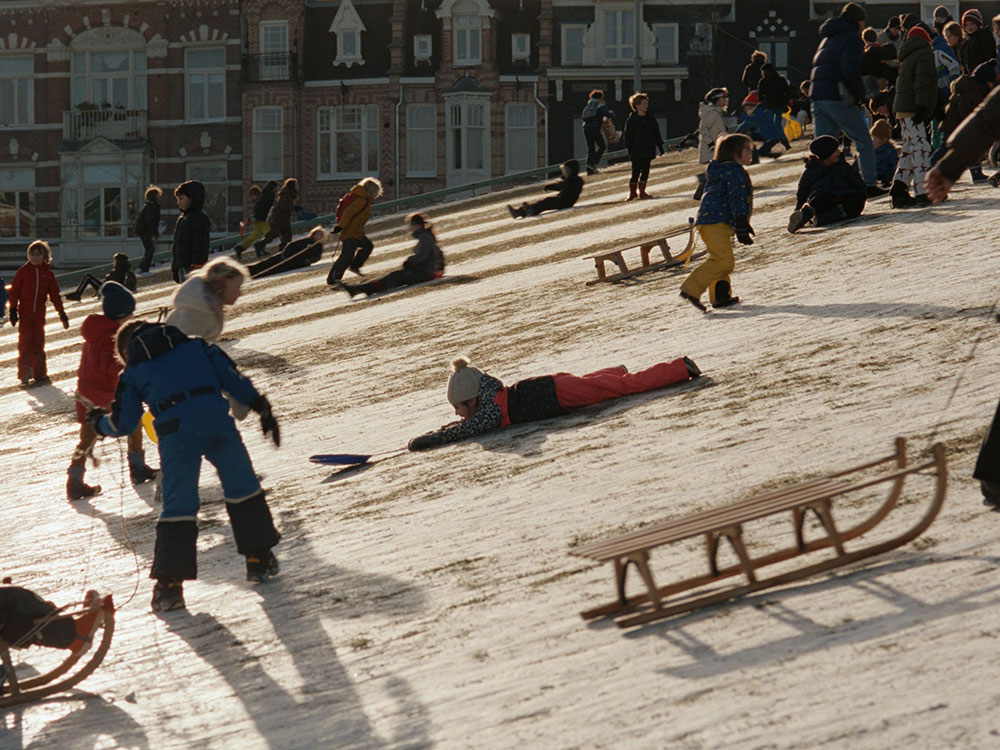
Abe Beame: Bianca, you've produced on Steve's films before, but what was it like having your work adapted for one?
Bianca Stigter: It was great. Let's say the book is, on the face of it, one you would not expect to be made into a film or inspire a film. So when Steve told me about this idea, I thought, that's amazing, and that this can be a new way to deal with a historic subject matter that has not been done before, as far as I know. So I thought it was quite wonderful.
AB: What was the most difficult aspect of adapting the book?
Steve McQueen: At first, when I wanted to make the picture, it wasn't about the book. It was about illuminating ghosts, because I felt I was living with ghosts [in Amsterdam]. The text was reverberating a past. I think what was exciting for me was to find it, more than anything else. It was one of those things which I was very grateful to have the time to do and try to get it right, because there was never a template for this. It was about finding it.
AB: Were there any works that inspired the way you decided to relate this history?
SM: Well, no, because the locations were the things, which was the thing that nailed us down to one place, of course: Bianca describing these addresses. Where they were informed it. But other than that, no, because it was a camera and a microphone and lenses. The challenge was how do you illuminate, how do you retrieve the past in the present, or at least look at the present again? Sometimes it's one of those things, just knowing where to put the camera. How do you tell the story?
AB: Warhol was reportedly an inspiration for some of your earliest work. I could see something in the observational endurance quality of this film that was reminiscent of his. I was wondering if that might have been a point of reference.
SM: Well, I don't think Warhol played a part in any of my work—as a direct influence, I mean. I think it's about looking. It's just about looking. I don't think Warhol has a monopoly on looking. That word, endurance, it's not about, for me, a test of stamina, of looking. No. It's not about pain, or any sort of physical endurance test. No. If anything, it's about meditation. So I wouldn't look at Warhol as some kind of influence at all. Because this is a place, a city. Look up anything Warhol has done. There's no real comparison, as far as I'm aware. It's not Chelsea Girl. It's not a 24-hour film.
AB: I thought that what [the narrator] Melanie [Hyams] did was incredible in the film, and it's a shame that there's not an award for that type of performance. How did you cast her? How do you direct a performance like that, and how long did it take to record everything?
SM: Well, Melanie was going to be a temp voice at first. I was introduced to her by Xander [Nijsten], my editor. And then she was delivering everything how I wanted it to be. But I thought, “OK, maybe she's a temp voice.” But the time that I spent with her recording, and timed with the images, it just got embedded and embedded until, “OK, that's the voice.” It was one of those things that synced into the pulse of the film, into the celluloid, and that kind of delivery was—Bianca was talking about [it] as dispassionate—but the voice had a stake in the future. This is a young woman's voice. So it was not of then, of 1940.
BS: It's also not a voice that speaks out of a position of authority. It's a voice that also just discovers what she's reading. So she's one step ahead of the audience. But for her as well, it's a kind of voyage of discovery.
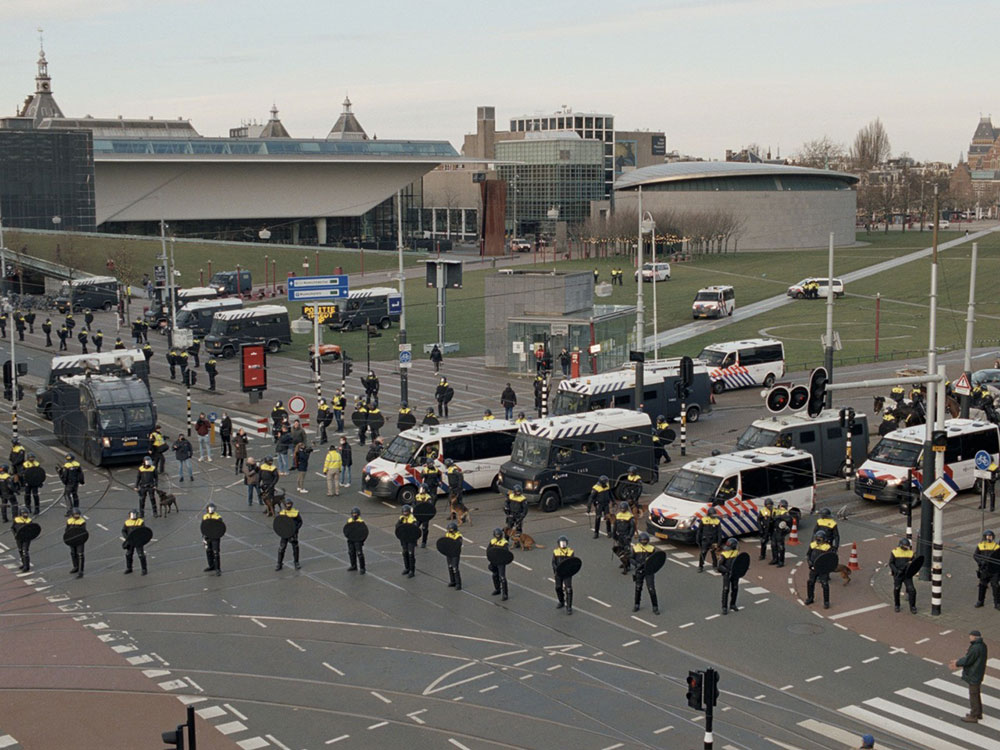
AB: Have either of you seen [Jonathan Glazer’s] The Zone Of Interest [2023], and if so, do you feel that there's a quality between the two films in conversation, in their approaches to the quotidian in the face of monstrous evil?
SM: Well, I think they're very different takes. I think, obviously, our film is nonfiction, and it's showing how things are today and how things were then. They're very different approaches, other than the fact that both our film and that film look at that period. For me, one is a much more classical approach than the other.
AB: Was there any logic to the specific addresses and events that you chose to relate, and the order in which they're delivered? It's a film, so obviously there's a procession, there's a way that these things are presented and, I would assume, an intended effect.
SM: Sure, the editing process started for me— I had to start at the lowest, darkest point in the film. So I started with the people who took their lives and they took their children's lives. I thought I had to start there. I was trying to work from the darkest, deepest moment of no light, and try to work my way out of that with the editing. And from there, things started to come about.
And then from there, it was like an English garden where you find yourself, or you get lost and then find yourself, then come back to meander. To have a situation where you could wander off but also come back. So it was almost like an English garden—unlike a French garden, which is obviously very formal—to get lost and to be found.
AB: Yeah. That was my exact experience.
SM: Bianca's book is very regimented.
BS: Neighborhood by neighborhood, street by street.
SM: But it's a book that you don't read from cover to cover. If you're in Amsterdam, you dive into the book on your street, on your address, if you can find it. And then you move around to different places. So in some ways, it was about replicating that experience of meandering through the book.
AB: Did either of you discover big-picture ideas of the Holocaust that you didn't have before you started the project?
BS: Yes. The Holocaust—that big number of six million people being murdered—can become something you cannot fathom, and it becomes something abstract. And here, for at least a little part, it's filled in. And you realize this was done by people to people, from individuals to individuals. And that is something that you know, of course, rationally, but it's something different to know something and to really have it sink in. And that is, for me, also the value of hearing so many stories, to really see that it happened to individuals, and it was done by individuals.
AB: The retail-level murder.
SM: There's a certain distance you take from history. But what happened during the process, for me, at least—and definitely for Bianca, because she’s been looking for 20 years—it became personal. It became more personal than it's ever been. Of course, it's a horrendous, horrific tragedy, but it became very personal. [At] the end of the picture, it's our friends whose son is having his bar mitzvah. So it became personal through the journey of making the picture, for sure.
BS: And, of course, let's not forget the most harrowing thing was when I couldn't find any information about a person except that he or she was born and then murdered. That was terrible. At least if you could find something to tell about a person, they’re still there, in a kind of way.
AB: How do you think Occupied City fits alongside Hunger [2008], and Twelve Years a Slave [2013], and Small Axe [2020], and all of your work? Do you think that there's a theme that unites these films?
SM: Yes, me. That's what I can say about that. [laughs]
Like any- and everybody, you're searching. You're looking for some kind of understanding and meaning of who we are, and where we are, and where we're going. And you try to measure that by where we are now, trying to investigate that. That's why I'm after, that's why I'm interested. So it could be a comedy, it could be science fiction, it could be a heist movie. It could be a movie about slavery or sex addiction or hunger strikes, about a blues party somewhere in West London in the early ’80s or the late ’90s.
You're just searching and looking for some kind of understanding, and you're not necessarily going to get it, but at least you do something. At least you go waste some time before you pass. You get busy at least, because there is no meaning in the end of the day. You're trying to make sense of it all. And I think that's why making cinema, even looking at cinema, is a kind of religious experience. But you end up finding the more you know, the less you know.
AB: Steve, I had entirely forgotten that you shot a video with Kanye once. In light of his last few years, and this project, I was wondering how you felt about that collaboration now, and if you had any stories from working with him?
SM: [gives a long, deadpan look directly into the camera]
[all laugh]
AB: Listen, I'm a rap writer by trade. I had to ask. I'll move on.
Covid plays an interesting role in the film. It's a throughline that's introduced five minutes in, and some of the more complicated early images are in conversation with Covid protests and the police response to it.
I think there is a literal reading of that juxtaposition that essentially positions a group of anti-Covid-restriction protesters, who are resisting public-safety protocols, as they are being kettled by the police, with the resistance to Nazism. How would you respond to that?
SM: No, because there's no voiceover on those protesters. We're going from the Rijksmuseum to the Concertgebouw. And by us moving at that time from the Rijksmuseum, we come across these protesters, and there's conflict with the police and so forth, that we move over. There's no indication of any kind of comparison to any kind of thing from that time in space other than the fact that [in] this time in space, people were protesting against the lockdown. It's like North Pole, South Pole.
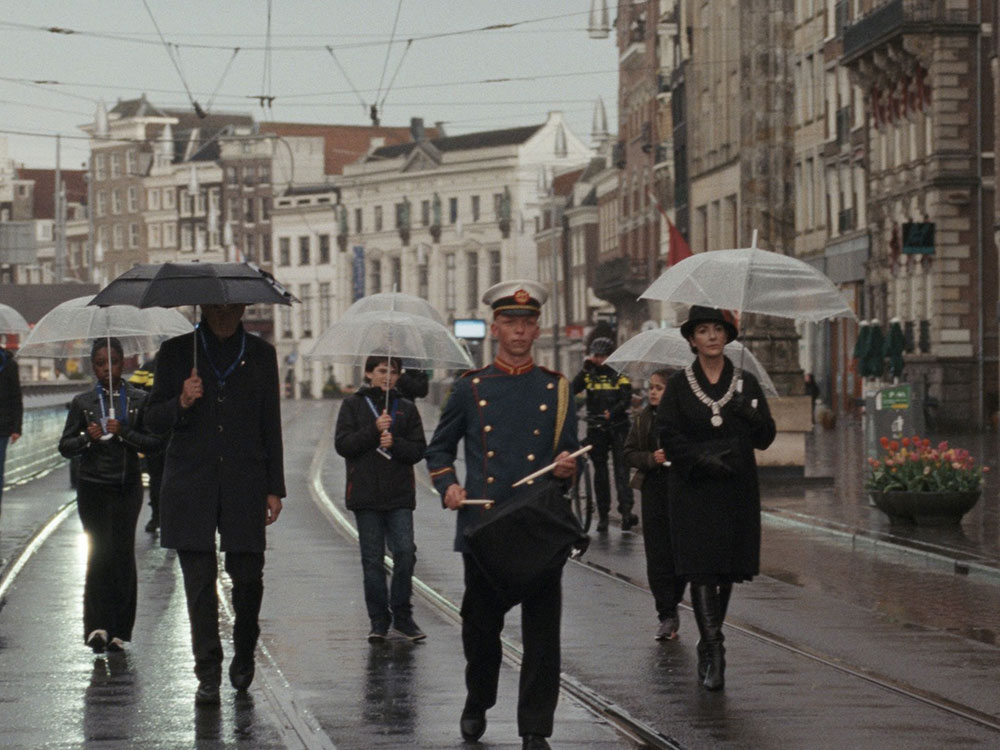
AB: I would gently push back that its inclusion feels intentional. And it's hard to cover this subject matter, when presented with those images, without the suggestion of echoes.
SM: I think you're a reviewer, you're a critic, that's your job. That's what you would do. You want to interpret things which can make sense for you. But like I said before, nothing makes sense. Nothing makes sense. So therefore, one can't compare Nazi-occupied Amsterdam to vaccines. That’s a hard sell. And the fact there's no voiceover addressing that is there to see. But this is how we live now compared to what was going on in 1940. And I think it does a disservice to the people who survived in a way that one could actually even compare that, because it obviously doesn't make any sense.
BS: If anything, for me, the film shows there just is no comparison between lockdowns and Nazi occupation and the Holocaust.
SM: But I suppose it does tell you that people died and fought and died for freedom, and then you could do what the hell you want with it. People died and fought for kids, young children, to not even give a fuck about the Second World War. And that's well earned. People could do what they want.
There are fantasists out there who like to sort of compare things to things. But let's stick to the facts. People always try to make sense, and often or not, people make nonsense, but that's OK too. But the fact of the matter is, what's happening there is the liberty that people have earned through sacrifices. That's what happens.
BS: In this movie, the text which you hear is very factual. There's not a lot of commentary in there. It just tells you, as basic as it can, the facts of what happened in a certain location. So the links you can make between what you see and what you hear are there for you to make. And there will be some scenes where it’s very easy to find that link. And with others, you see a contrast and it gets puzzling. Is there a link, or can I link this? Some people, obviously those protesters might link it, but me myself, I think that link is not there at all.
SM: We're not going to give them any. People can link Swiss cheese to a computer. They could do whatever they want. But the fact of the matter, what's interesting about it, is that people are always trying to make sense out of things. But what we found out through our research of the Second World War is that the more you know, the less you know. It's just more complex than that, unfortunately. You try to make sense out of six million people being murdered. You can't make sense out of it.
BS: You start to investigate things in the hope that if I know more about it, I will understand more. But that last part just does not happen.
SM: If anything, what that scene demonstrates is who we are now and where we are now.
AB: It would be an abdication of my responsibilities not to ask this last question. And I know it's award-season poison, but you’ve made a film that has a lot to say about oppression, occupation, the way that we live with these things, the way time passes, and how the ways that we think about things change. Do you have any thoughts on the current occupation in Gaza and the West Bank?
BS: Yeah, well, of course. I think people will think about that when they see this movie. And there's just more atrocities that are incomprehensible to deal with. So if anything, it makes it more difficult to watch.
SM: And the reason why it's more difficult to watch is that it seems like things haven't moved on. We obviously seem not to have learned from the past, or we're incapable. I don't know. That's unfortunate. And that's why we always try to look for answers and the morality and whatnot. Then when you just find out, it's just more unfortunate. It's just more complex than that. The simplistic answers are not there because, again, even this subject, I'd rather not talk about it. Not because I don't want to talk about it, [but] because I feel that one has to come with solutions rather than just more rhetoric or more noise. What we want now is solutions, not just other people giving their opinions.
Occupied City opens today, December 25, at Film Forum.

